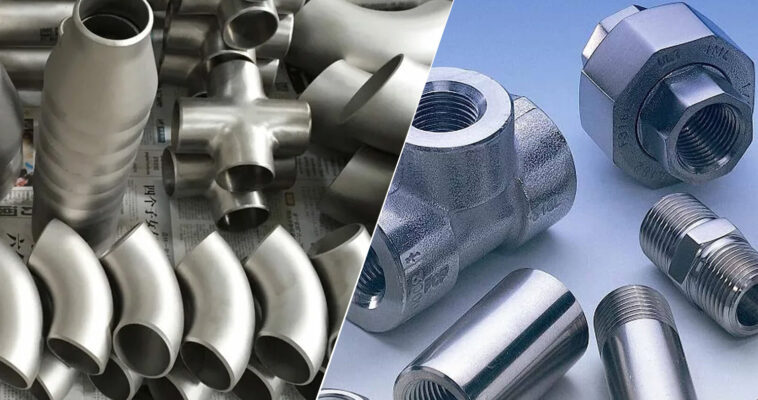In industries where durability, performance, and reliability are critical, material selection can make all the difference. Nickel 201 Forged Fittings are a prime example of how the right material can extend the lifespan of critical components, even in the harshest environments. This blog explores the unique properties of Nickel 201, how it ensures longevity, and why it is a preferred choice for industries operating under extreme conditions.
Understanding Nickel 201
Nickel 201 is a commercially pure nickel alloy (99.6% minimum nickel content) with low carbon content compared to its counterpart, Nickel 200. This reduced carbon content makes Nickel 201 more resistant to intergranular corrosion and better suited for applications involving elevated temperatures or aggressive chemical environments.
Key Properties of Nickel 201
- High Corrosion Resistance: Superior resistance to a wide range of corrosive agents, including acids, alkalis, and neutral media.
- Thermal Stability: Excellent mechanical properties across a broad temperature range, from cryogenic conditions to elevated temperatures.
- Non-Magnetic: Maintains non-magnetic properties, which is essential in specific industrial applications.
- Ductility and Toughness: High ductility and toughness allow Nickel 201 to withstand mechanical stress and deformation.
- Oxidation Resistance: Withstands oxidation in high-temperature environments, ensuring prolonged service life.
How Nickel 201 Forged Fittings Ensure Longevity
1. Superior Corrosion Resistance
One of the primary reasons for the exceptional durability of Nickel 201 forged fittings is their resistance to corrosion. They perform exceptionally well in environments with:
- Caustic Alkalis: Nickel 201 is highly resistant to caustic soda and other alkali solutions, making it ideal for chemical processing plants.
- Acidic Environments: It resists corrosion in dilute acids such as hydrochloric acid, sulfuric acid, and phosphoric acid.
- Seawater and Brine: The alloy’s resistance to chloride-induced stress corrosion cracking ensures reliable performance in marine environments.
2. Thermal Stability and Oxidation Resistance
Nickel 201 forged fittings maintain their mechanical properties across a wide temperature range, from sub-zero cryogenic conditions to temperatures exceeding 600°C (1112°F). This stability makes them ideal for:
- Heat Exchangers
- Furnace Components
- Steam Generators
Additionally, their oxidation resistance ensures they can operate in high-temperature environments without compromising structural integrity.
3. Mechanical Strength and Toughness
Nickel 201 forged fittings are known for their strength and toughness, which allow them to withstand:
- High-Pressure Environments: These fittings can handle high-pressure conditions commonly found in power plants, petrochemical facilities, and oil refineries.
- Mechanical Stress and Vibrations: Their toughness ensures they resist fatigue, deformation, and cracking under continuous mechanical stress.
4. Resistance to Intergranular Corrosion
Due to its low carbon content, Nickel 201 is less susceptible to intergranular corrosion at elevated temperatures. This makes it a preferred choice for applications where:
- Welding is Required: Ensures the integrity of welded joints.
- High-Temperature Processing: Suitable for thermal processing equipment and piping systems.
5. Non-Magnetic Properties
Nickel 201 retains its non-magnetic properties, even in extreme conditions, making it valuable for applications where magnetic interference must be minimized, such as:
- Electronics and Electrical Systems
- Aerospace and Defense Equipment
Applications of Nickel 201 Forged Fittings in Harsh Environments
Due to their exceptional properties, Nickel 201 forged fittings are used across various industries that demand high performance and longevity:
1. Chemical and Petrochemical Industry
Nickel 201 forged fittings are widely used in chemical plants for:
- Handling caustic alkalis and acids.
- Reactors, heat exchangers, and storage tanks.
- Piping systems transporting aggressive chemicals.
2. Marine and Offshore Industry
Their resistance to seawater and marine atmospheres makes them ideal for:
- Desalination plants.
- Offshore oil rigs and platforms.
- Shipbuilding and marine equipment.
3. Power Generation
Nickel 201 fittings are critical in power plants for applications such as:
- Steam and gas turbines.
- Heat exchangers.
- High-temperature piping systems.
4. Aerospace and Defense
In the aerospace and defense sectors, these fittings are used in:
- Jet engines and turbine components.
- Missile systems and defense equipment.
- High-temperature aerospace structures.
5. Food Processing Industry
Nickel 201’s non-reactive nature makes it suitable for food processing applications, ensuring:
- Product purity.
- Resistance to food acids and cleaning agents.
- Compliance with sanitary standards.
Maintenance and Longevity
To maximize the service life of Nickel 201 forged fittings, it is essential to:
- Ensure Proper Installation: Follow industry best practices during installation to avoid stress and deformation.
- Regular Maintenance: Periodic inspection and maintenance can help identify early signs of wear and corrosion.
- Use Compatible Components: Ensure all system components are compatible with Nickel 201 to prevent galvanic corrosion.
This post was created with our nice and easy submission form. Create your post!





